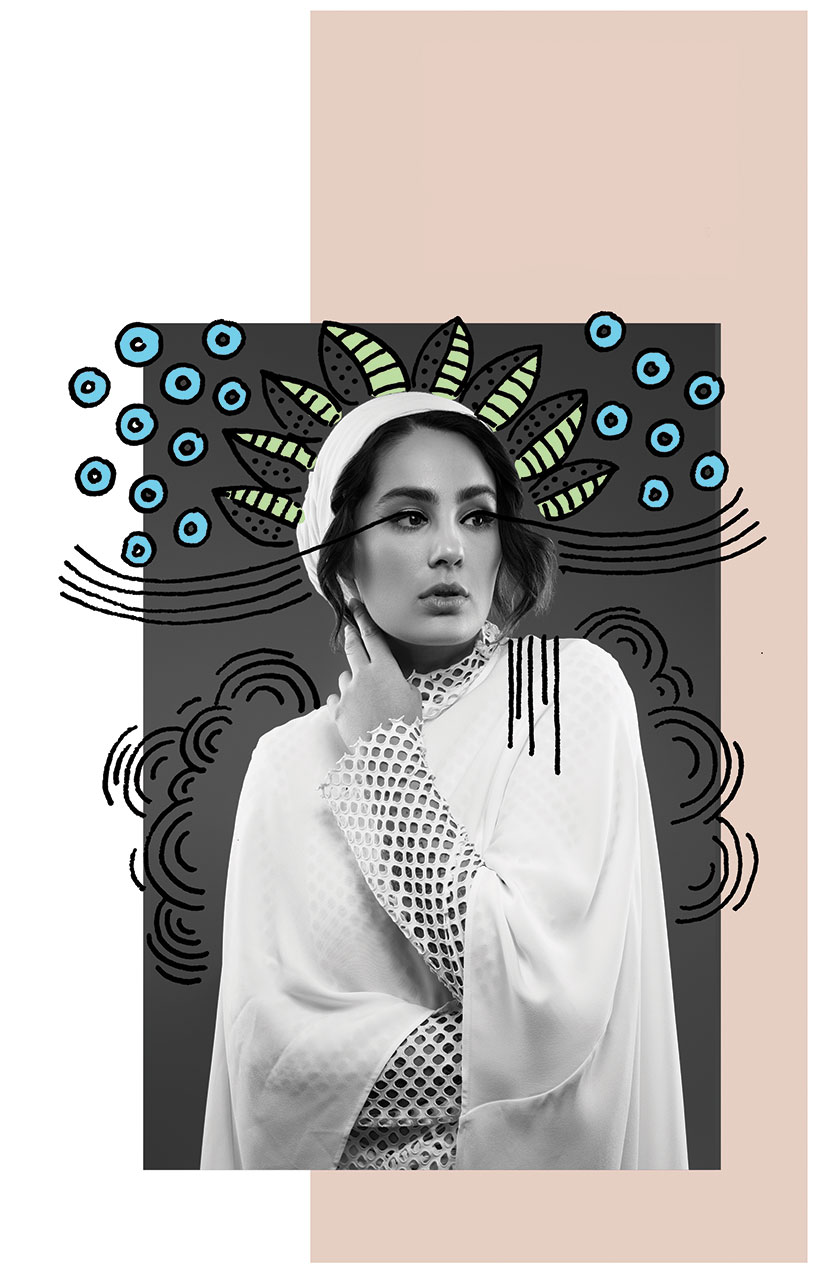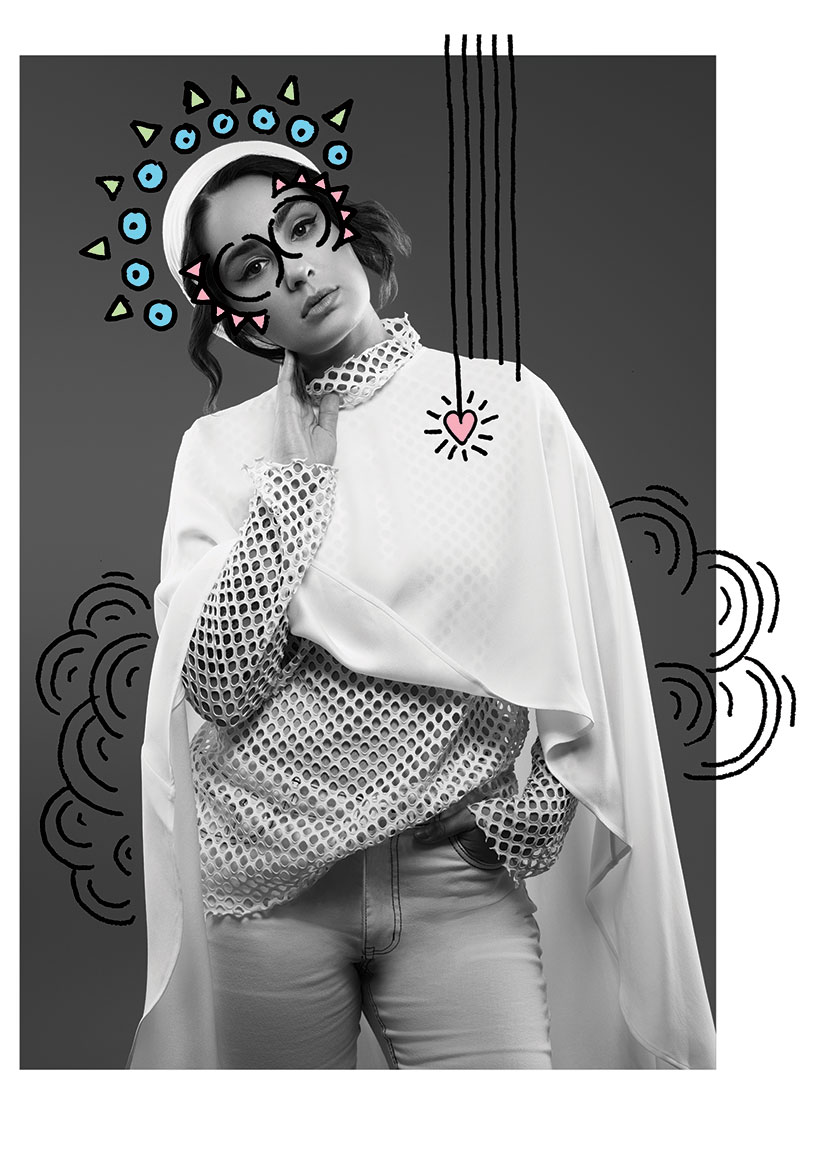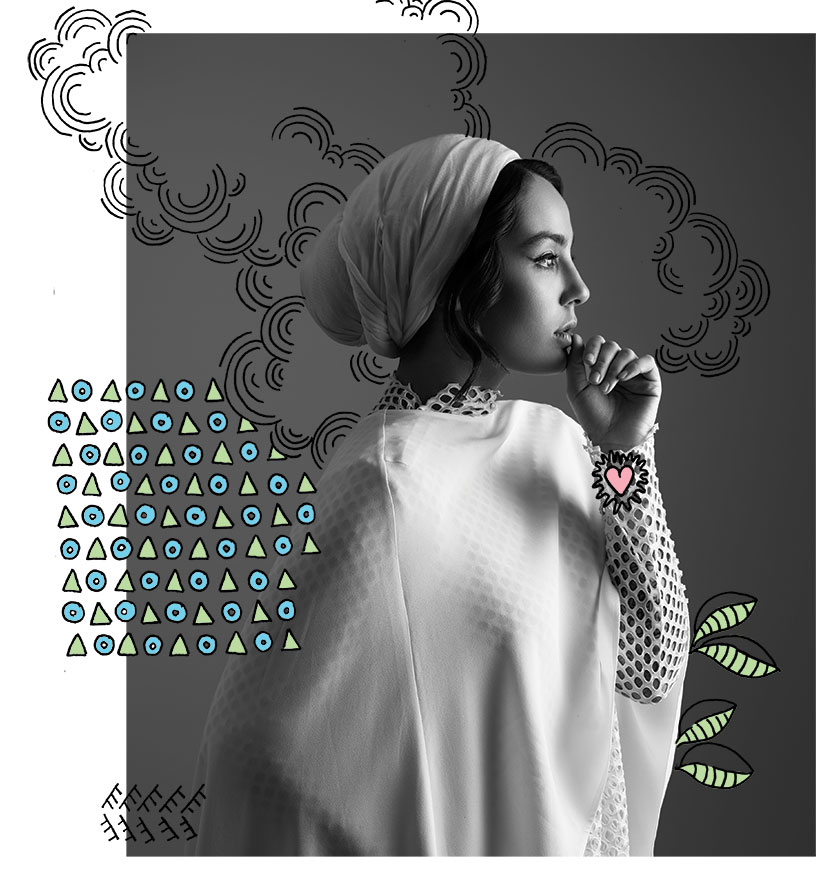Influencers are getting a lot of flak lately. For some, one could easily quip that said flak is well-deserved. People love to consume drama and speculation, and whatever fanfare influencers present, the reactions will naturally edge towards the extreme. They’re ferociously judged, positively or negatively. Forever deemed to be perceived from one hardliner’s perspective or the other. They are either inauthentic, too flashy, too dramatic, too shallow, too cool (if that’s even a thing), and dare we say it, too ‘predictable’ at times. Kuwaiti influencer, fashion blogger and Vlogger, multi-business owner Ascia Al Faraj is no stranger to these judgments. If anything, she is almost immune to them.
Art Director: Adel Alansari for Bazaar Studios
Photography: Faisal Al Bisher
Illustrations: Nada Dalloul
“I promised myself and our team, that this would be the year that I would stop caring. I care too much about other people’s opinions of me,” Ascia started off our conversation, nodding in agreement that this all began when she released the viral Hijab video last year, “While that might does sound flippant, I don’t mean it negatively. I still care about people, of course, I just care less about their perception of me. This year, I’ve had to accept that there is a version of me in everyone’s mind, and I cannot control that. I can only control what I put out, and how it is consumed is not my responsibility anymore.”
And in a continuous chain of dynamic appearances, from her most recent highly acclaimed interview with Anas Bukhash to this remarkable conversation, we are seeing more and more of an Ascia who, once stayed far away from being the center of attention during her high-school days. But she’s come a long way since then.
Sure, we all know and love her from her social feeds. Her effervescent smile, captivating charm and intrinsic ability to relate to people from all walks of life—all of this is true, and very real, attracting millions of followers. Despite all of this popularity, she still seemed to hold back when it came to her personal opinions.
For Ascia, learning to open up herself to the public, in and of itself, is a difficult process. Nonetheless, this is truly shaping up to be a year of milestones for the multi-faceted woman. She is celebrating the first anniversary of Korean beauty brand Seoul Kool (click here to read our exclusive feature on how it all began!), Desert Baby is in full swing, and her work in social continues to thrive. She is also celebrating her 30th birthday this autumn, marking a turning point in a journey that began in 2012 with the inception of her hit blog, The Hybrids.
At a time when influencers seem to be figuratively dying out in terms of their authentic authority, hers is soaring high. Whether Instagram is considering the removal of the elusive ‘like’ button, we highly believe that her popularity would remain unaffected. It is Ascia’s intent, however, that is changing and evolving immensely, as she considers the meaning behind everything that she is putting out online.
KEEPING IT REAL
It has become growingly difficult to empathize with the other in today’s digital world. We mindlessly consume, believing everything we see online either as extremely true based on our experiences, or extremely false. And in Ascia’s quest for authenticity, not wanting her identity to completely belong to people is a harsh truth that she herself is coming to terms with.
“Having everyone know you, and knowing that you don’t belong to anyone, while still giving out something that belongs to you, is hard. [It] feels like a bit of a betrayal of one’s self.” She’s constantly questioning whether or not she is being ‘real’ herself.
At a time where everything you would ever want to know about a person could be freakishly found online with a google search (or ten, just depends on how good your stalking skills are), Ascia still wants to directly relate to her followers, but without any pretense.
“…This year, I’ve had to accept that there is a version of me in everyone’s mind, and I cannot control that. I can only control what I put out, and how it is consumed is not my responsibility anymore.”

LIVING WITH IMPOSTER SYNDROME
Imposter Syndrome plagues the minds of many people around the world on a daily basis. Commonly defined as a recurring pattern in which a given person doubts their achievements, constantly fearing to be outed as a fraud of sorts, and always feeling undeserving of their accomplishments.
Now, imagine living with that, when your literal job is constantly having your face on blast for everyone to see, and doing it so well that others forget how hard it actually is. She openly confesses that, “having this Imposter Syndrome where I don’t believe I earned any of the people who enjoy my time because I give them a filtered version of myself is hard enough.”
Then, she’s flung from the front lines of social, to having to sort through a mountain of stock for Seoul Kool, to deciding on the latest fabrics for Desert Baby. Having to make decisions on the fly—all of this didn’t come naturally or easily for Ascia.
“It didn’t help having to turn into other people’s bosses. It’s not something I am tangibly touching anymore. Every aspect of the company is no longer physically touched by me and in turn, I constantly find myself saying ‘I didn’t earn this’ when in fact I did earn it through delegation and proper management of people’s time and my time. Finding my way in that was difficult.”
You would think that having a vibrant team by her side would make it all less daunting. But she always finds herself stressing. She laughingly added, “I used to end up micromanaging, so why did I hire a team if I can’t empower them to grow? Finding myself professionally in this new role is still a challenge, but it’s helping me grow as well. It’s actually a good thing!”
WHEN THE FEAR FACTOR IS A GOOD THING
Before it all began with The Hybrids, Ascia had felt alone for quite a long time. She first went online with the desire to relate to others, but to also push her boundaries, without having to make The Hybrids about her own personal or family life. For years, we consumed a stream of online adventures, incredibly curated outfits and amazing fashion collaborations.
But nowadays, when it has become so commonplace to work in social, Ascia is constantly seeking the next push. She is doing this by unveiling more of her personal self, as she had done in the Anas interview and with her goal to share more Vlog posts online, while also navigating her new role with Seoul Kool.
“Putting myself out of the comfort zone again felt like a natural thing to do. I have been in social for so long that I forgot that feeling of fear, which is nice to feel again. It means I still care. You become so numb to it after a while, it becomes monotonous, a job, a routine.”
And it’s not just about pushing her boundaries, but rather about what Ascia learns from each and every experience, good or bad.
“[I learned that] I’m not as strong as I thought myself to be, which is good. I [had] put it in my mind, for a long time, that I can handle everything. You get to a point where you disassociate from your true self, and feeling fear humanizes you.”

STAYING THE COURSE NO MATTER WHAT
Imposter Syndrome doesn’t allow you to enjoy your achievements, but working in social can sometimes get to your head. Most of the time, it is Ascia’s team that steps in to remind her to embrace the positive, to let that sense of achievement fully sink in, and to let go of the negative, such as when people use her social media presence against her.
She stated, “I have a lot of people around me who keep me grounded, I don’t get away with anything! Which is awesome, I don’t want to and prefer to hold myself accountable. But this year, I’m having to face my 2011 self. That sucks. I am doing this while knowing that other people are digging for it.”
It’s these little (well, not so little) things that escape us, which, in a digital world, form a clear separation between ‘influencer’ and ‘follower’, and we forget the importance of having a strong support system to get you through it all. She even admits that, for a while, she did feel lost in working in social.
“When everyone online is telling you that you’re so amazing the whole time and then you suddenly see criticism, it is so stark. Being loved is great, but it’s not essential to growth. You can get lost in ego so easily. This is why we don’t have ‘yes men’ on the team.”
Ascia could easily delete parts of her past if she wanted to, any and all of it, but she stresses that one can’t just pick and choose which parts to remove from their social presence without completely reconciling what these parts mean for their development. As an influencer, you would also have to really think about what that means for your brand, and your sense of authenticity.
“Cancel Culture is the worst. It is so toxic, plus you can’t do it. You can’t cancel your past. I would like to clean up things I no longer hold as truths for myself. Which I believe is fair enough.”
Technically, you can completely ‘cancel’ your social media presence, and one might even argue that owning your own content should be reason enough to do whatever you please with what you put on social media.
Once again, Ascia acknowledges the importance of intent with the content that she presents. Not only for herself, but also for her family.
“I’m actively phasing out my kids from our various social media accounts. Only because, as they are coming into their adolescence, they should now control their digital footprint. Why would I allow that for my kids and not allow that for myself? When I look back at 18, I was just a kid myself.”
RESILIENCE VERSUS AVOIDANCE
From dissecting the meaning of ‘Cancel Culture’, tackling cyber bullying as a judge on content creation competition Sadeem’s latest launch campaign, to opening up about her previous experiences with bullying and her struggles with eating disorders.
Ascia smiles, despite the fact that our conversation was about to take a darker turn. Rather than sensationalize the drama, she embraces what it meant for her personal journey.
“I have allowed myself to learn and grow in the years after I graduated [from high school]. I recognize that anyone who did anything to me, is also not the same person. I don’t feel like it would be fair of me to avoid giving them the room to confront these issues as well.”
She recalls her experience with bullying, as told during the interview with Anas Bukhash with an enlightened approach. “I also had a hand in it.” She believes that being the victim of any bullying situation is very real, but also, being the victim means that you were a part of the situation, and that your growth as a victim does not take away from the growth of the bully either.
“The girl I mentioned in the story was my very close friend, and then we fell out. Where in that relationship did I have a hand in pushing her to the edge? Did I snap? I only know the way I consumed the situation and the way I felt about it. It’s not so much the avoidance of a given topic, or just never bringing it up, and feeling that you’ve tackled it and gone past it. This especially applies in a public sphere, and allowing people to have the privacy to tackle that the way that they choose to, is so necessary.”
“I have been in social for so long that I forgot that feeling of fear, which is nice to feel again. It means I still care.”
FAMILY IS KEY
With the digital documentation of so much of her day’s every move, we often wonder what life is like for someone like Ascia when all of the cameras are switched off. When the make-up comes off (well, In Ascia’s case we see this a lot, especially when she’s demonstrating the detailed Seoul Kool 10-step Korean beauty regimen for others to learn and emulate).
When it’s time for parent-teacher conferences. She said of the carefully selected segments that she shows to her followers about her family life, “I want to present myself [online], not in a cookie cutter format, but with the experience of raising these human beings.”
And while she is now actively seeking to keep elements of her private life remain truly shielded from the public sphere, Ascia stresses that, for her children’s sakes, keeping a normal routine is important. She is still, like every other parent, figuring things out as they come.
“I can teach them how I do things; I can’t teach them how they should do things. As long as they don’t harm people in the process of their growth and development, I can’t expect them to replicate my experiences. I’m still raising such young children. It’s so well and good to have ideas, but I won’t know until I am in the thick of it.”
Trying to raise respectful, well-behaved little humans is hard for anyone, influencer or not, but fortunately, and because of Ascia’s constant desire to keep things as real as they come, she is allowing her children the space to ask questions and to be open.
INFILTRATE, INFILTRATE, INFILTRATE
No, this is not some spy thriller plot for Ascia’s next Vlog post, but rather her desire to understand the ‘other’s’ perspective as a necessary way of being. Ascia’s seamless integration of different cultural backgrounds through her unique style and social presence is remarkable.
And the clear reconciliation of these differences did not come easily to her. She learned this as she explored the facets of her own background, with roots from both Kuwait and the deep south in the US.
“I always recognize that, whether I am speaking on Kuwait or the US, that I speak from a place of privilege.” She could easily disregard others’ criticisms of her way of being, but she chooses to infiltrate these prejudices as a way of understanding.
“Infiltration is necessary. You won’t get anywhere without it. You become so dogmatic in your beliefs that you refuse to move, regardless of where the prejudice comes from. It’s pure ego if you are unable and unwilling to open your mind to a different perspective. You could have the best outlook on life, be racially aware, be the most sensitive person, but when you are trying to put all of those thoughts on to another person you become just the same as them. Take any form of extremism— religious, social, racial—if you’re willing to make a change, you will not go at each other. I want to see the change, I want to make it, I will do it slowly and that’s okay.”
Learning all about the ‘other’ stems from Ascia’s studies. She graduated summa cum laude from American University of Kuwait (AUK) with a double major of International Relations and Cultural Anthropology. In doing so, she has completed a vast study dedicated to learning about other people, cultures, way of life, and sexual orientation, for instance, in order to have these difficult conversations.
“Watching people who are so openminded and intellectual be so dogmatic in their ways is eye-opening. You might not be an anthropologist by degree, but by life and practice. If that’s what you are, you need to own it. You need to give each person their own time to reach a middle point where you can both agree to move forward. If you’re living in the 1950s, and you’re stuck there, I will go there with you and learn why we are so different.”
That’s the thing about Ascia, she infiltrates the other’s perspective and is not afraid to explore it. She applies this view to every facet of her life.
“That doesn’t aid with the Imposter Syndrome, or the quest for authenticity online. You’re changing yourself little by little for each person and your consumable self is so different in each person’s mind. It’s hard.”

“You become so dogmatic in your beliefs that you refuse to move, regardless of where the prejudice comes from. It’s pure ego if you are unable and unwilling to open your mind to a different perspective.”
‘BEING’ IN SOCIAL
We are witnessing many different experiences and formats of working and living in social, from new live streaming formats, to hours’ worth of Instastory content on a given day from a specific influencer.
After all that is said and done, acknowledging that curated content is simply, well, curated content, creates key context for framing Ascia’s opinion on ‘being’ in social. The reality is the following: Ascia isn’t the star of every single new fashion label/fragrance/restaurant/product launch, and she doesn’t necessarily want to be.
She explained that “being in social is so individualistic. It’s so easy to simply consider having a position in social just like [having] any other job. Some people are so good at compartmentalizing their ‘social’ work and their personal lives. Who cares about what people think about your ‘performance’?” But she is rather asking herself, “Are people authentically consuming what I am putting out there? Is this me? Is it 100% myself?”
These are surely hard questions, ones that we often wonder if ‘influencers’ are even asking themselves, but Ascia and her entire team genuinely care about who they align themselves with.
THE SUM OF ALL THE PARTS
Ascia’s character is the sum of many different parts and experiences—some of which she graciously chose to share with us in this scintillating conversation.
She remains unabashed by what change could bring, both afraid and unafraid to deal with any backlash, while still recognizing her humanity to have the strength to admit when she is having a reaction, be it from a choice that she made, to other peoples’ judgments.
Her sense of authenticity is not defined by a given picture on Instagram, a sensational interview on YouTube, a remarkable Vlog post, or even a grandiose collaboration.
And this is why we, along with her +2 million followers, love and support Ascia. Her sense of self is never static, but it is rather an evolving amalgamation of experiences, ever-fluid, ever-changing, but always growing.
For Ascia’s latest, follow her on Instagram @Ascia, and check out The Hybrids – Ascia & Ahmad, on YouTube.










